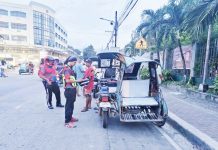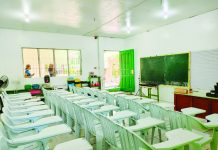
ILOILO – Proud of his heritage, a member of the indigenous people (IPs) from the island of Mindoro wore a traditional garb as he received his college diploma from a state college in northern Iloilo.
Anthony Suday made history at the Northern Iloilo Polytechnic State College (NIPSC, Batad, Iloilo campus) by becoming the school’s first Mangyan graduate.
A native of Barangay Pag-asa, Sablayan, Occidental Mindoro, he successfully completed his Bachelor of Science in Agriculture degree.
During the commencement exercises at NIPSC’s main campus in the municipality of Estancia on April 2, Suday donned a colorful loincloth as he walked barefoot on the stage to receive his diploma from the school president, Dr. Ma. Theresa Palmares.
“He worked very hard for his college diploma,” said businessman-philanthropist Rene Sausa of Balasan, Iloilo.
Suday was one of several scholars of Sausa and his wife, an Ilocana who has landholdings in Mindoro.
Suday was 13 years old when the Sausa couple took him under their care in 2009. He finished his secondary education at Balasan National High School.
“He is an honest and kind person,” said Sausa.
Suday chose Agriculture as his college course so he could use his knowledge in this field when he returns to Mindoro, said Sausa.
Mangyans are mainly subsistence agriculturalists, planting a variety of sweet potato, upland (dry cultivation) rice and taro.
Sausa said he was proud of Suday whom he described as persistent.
The local government of Sablayan, Occidental Mindoro was so impressed with Suday’s feat that it decided to offer him a job, Sausa revealed.
The philanthropist hopes his other Mangyan scholars – currently in their elementary and secondary levels of education, or taking the Alternative Learning System – would be able to earn college degrees like Suday.
“I don’t care sa grades. Importante kapasar sila,” said Sausa.
He believes education is key for his scholars to improve their lives.
The Mangyans were once the only inhabitants of Mindoro. Being coastal dwellers at first, they moved inland and into the mountains to avoid the influx and influence of foreign settlers such as the Tagalogs, the Spanish and their conquests and religious conversion, and raids by the Moros.
Today, Mangyans live secluded in remote parts of Mindoro but every now and then comes down to the lowlands to make usual trades. Their sustenance are farming for their own crops, fruits and hunting.
A certain group of Mangyans living in Southern Mindoro call themselves Hanunuo Mangyans, meaning “true”, “pure” or “genuine,” a term that they use to stress the fact that they are strict in the sense of ancestral preservation of tradition and practices.
Before the Spaniards arrived in Mindoro, the Mangyans traded with the Chinese extensively, with thousands of supporting archaeological evidences found in Puerto Galera and in written Chinese references.
A division was created among the people of Mindoro when the Spaniards came. There were the Iraya Mangyans, who isolated themselves from the culture of the Spaniards, and the lowland Christians who submitted themselves to a new belief system./PN





